As it turns out, things are rarely simple. Turns out there are two pronunciations: 'babay' [ɪi] and ‘babih’ [ɪ]. These two pronunciations don't just sound similar - they actually occur in similar places song-wise, and you can even hear both pronunciations in a single song! What's the deal with that? What follows is my nearly hundred-year-long journey down the rabbit hole of recorded music to explain to you what is the deal with "babih" and "babay."
GLOSSARY
Throughout the article, I'm going to use a system called the International Phonetic Alphabet (IPA) to transcribe the sounds I'm describing. The IPA is useful because you read it the same way, no matter which language or accent you speak. Once you know the sound a symbol stands for, you can read that symbol every single time you encounter it. However, most people don't know the IPA at all, so I'll be supplementing this transcription with an ad hoc one based on English.- Tense-Happy: When the final vowel in words like 'happy', 'baby', 'coffee,' etc. is pronounced with the same vowel as in fleece: [i]. Assume this pronunciation when you see a lyric spelt normally. e.g. "happy [hæpi]."
- Lax-Happy:: When the final vowel in words like 'happy', 'baby', 'coffee', etc. is pronounced with the same vowel as in kit: [ɪ]. The ad hoc spelling for this is -ih. e.g. "happih [hæpɪ]."
- Break-Happy:: When the final vowel in words like happy, baby, coffee, etc. is turned into a diphthong and has a similar (but not identical) vowel to May: [ɪi]. The ad hoc spelling for this is -ay. e.g. "happay [hæpɪi]." In extreme cases, it can even have the same vowel as in May [eɪ]; this pronunciation will not be given its own ad hoc spelling due to its rarity, although the IPA will reflect the difference.
- Southern American English: The linguistic name for the variety of English spoken in the Southeastern portion of the United States. It is usually referred to as the "Southern accent."
- Southern Vowel Shift: A series of vowel changes that occur in SAE. One of the vowel changes that may occur is the "breaking" of the monophthong vowel /i/ (fleece) into a diphthong [ɪi] (similar to May).
- African American Vernacular English: The linguistic name for a variety of American English spoken primarily by African Americans that was heavily influenced by SAE. It has been referred to by multiple names of varying acceptability, such as "black English" and "ebonics."
LAXNESS, TENSENESS, HAPPINESS?
First things first, the ‘babih’ pronunciation appears long before the ‘babay’ pronunciation. Originally, words like ‘happy, baby, party’ had the lax vowel of kit [ɪ], not the vowel of fleece [i]. Starting in the 20th century, the version with the long 'ee' - which we shall refer to as tense-happy - became the dominant pronunciation in both the United Kingdom and the United States, while the older one - which we shall refer to as lax-happy - began to decline in usage. Many varieties of English (Modern British English, American, Australian, New Zealand) use the innovative tense-happy pronunciation, but there are some that have been unaffected by this change. One of these dialects is Southern American English, in particular the older forms. Another dialect that tends towards preserving this form, and which was heavily influenced by Southern English, is African American Vernacular English (AAVE).A VEDDIH BRITISH ACCENT
Let’s look back at the turn of the 20th century, when tense-happy was spreading in the US. Recorded music was starting to gain steam as an industry. Ragtime - a bouncy style of music with syncopated beats with African-American origins - had become the sound of the moment. Parlor music - simple songs meant to be played by musical amateurs - was the sound of yesteryear and yestercentury. To our modern eyes and ears, the early 20th century is very foreign, bearing little resemblance to our 21st century in either technological or aesthetic sensibilities. We'll be starting the aural portion of our story here, with a song recorded a literal hundred years ago.Elsie Baker and Billy Murray: "Play a Simple Melody" (1916)This song, written in 1914 and recorded in 1916, is about the musical and societal conflict between a parlor song enthusiast and a ragtime fan. We know the woman's snooty and elitist not just because she says ragtime "makes her poor heart ache," but because she's trilling her Rs [r] and pronouncing melody with an [ɪ] – both imitations of old-fashioned English Received Pronunciation (Harrison, 2006). For comparison, listen to real life Englishman Noel Coward in “Mad Dogs and Englishmen”. Americans have long associated English accents, especially posh ones, with elitism and snobbery, which jibes very well with the woman's desire to bring back "the rhymes of olden times."
ELSIE: Bring back the rhymes [raɪmz] of olden times ...
One with good old fashioned harmony [hɑɹmonɪ] - play a simple melody [mɛlodɪ]
BILLY: I don't care for your long-haired musicians with their classy [klæsi] melodies [mɛlodiz]
...Give me something snappy [snæpi] and popular...
Noel Coward: "Mad Dogs and Englishmen" (1931)Meanwhile, the ragtime fan expresses his lack of interest in "classy melodies" [klæsi mɛlodiz] and asks for something "snappy" [snæpi] and "popular." There is a clear contrast between these two singers – the woman sings long, rhythmically simple phrases in a faux-RP accent and a classical style, while the man sings choppier phrases in a ragtime-inspired style and an American accent. The message is clear – lax-happy is used by the old and out of touch, while the hip and modern youth use tense-happy.
In tropical [tɾɒpɪkəl] climes there are [ðɛrə] certain times of day...
Because they're obviously [ɒbvɪəslɪ] definitely [dɛfɪnɪtlɪ] nuts
NOTE: If you're interested in checking out the full versions of these songs, I'd like to give fair warn that they are what some scholars are calling "kind of racist." This era had little in the way of "tact" or "dignity" for people of color. Do with this information what you please.
So the turn of the century saw lax-happy as a passé pronunciation. If that's the case, how come it continues to be heard a hundred years later? Why are singers still saying 'greedih' and 'happih' and 'babih' if it was supposed to be a sign of stuffiness (and pop music is not about stuffiness)?
Ariana Grande: "Greedy" (2016)Enter the Jazz Age.
Greedih [gɹidɪ] ooh
you know that I'm greedy [gɹidi] for love.
YOU TURN MY MOOD FROM BLACK TO BLUE
Although the phonograph was invented in 1877, nobody realized its potential as a musical medium until later. In the late 19th and early 20th century, songs were sold as sheet music so that one could play them on the piano for one's family. Musicians had serious reservations about "canned music," and a lot of important songs from this time period were not recorded. Moreover, the primitive recording technology meant that only loud singers and musicians could be recorded. Nevertheless, sales of recorded music continued to grow and there was a boom in the 1920s (recording-history.org). We now have a lot more recordings and a lot more money being made off these recordings. At the same time, new genres of popular music were being popularized. Welcome to the jazz age. Jazz and the blues - and especially the blues - have been extremely influential on American popular music up until the present day. We can start to unravel the mystery of the -ih pronunciation here, in the 1920s, with the first blues records.Now this is important: the blues were created by African-Americans, Southern African-Americans to be precise. We don’t know when the blues really started – we know the blues existed by 1900, but it’s likely that the blues originated 1890s or the 1880s (Wright). Although audio recording has existed since 1877, there are no recordings of the earliest forms of the blues due to a lack of interest on the part of the few people with access to said technology. Nevertheless, some forward-thinking folk heard this form of music and thought it had commercial potential. The blues sounded unlike any of the popular music of the time; when African-American composer W.C. Handy first heard a man playing the blues in 1903, he thought it was “the weirdest music he’d ever heard”.
The first commercial blues records were released in 1920s. The early records sold well, creating a fad. Now American popular music has a tendency (minstrelsy, blackface, some vaudeville) of having white Americans copy (or mock) black musical traditions, which involves imitating not just the musical aspects, but the supposed dialect spoken by African-Americans. The 1900s and 1910s had their share of musical (and visual) blackface. When white artists started singing the blues and jazz, they continued to imitate how African-Americans spoke, although to a less hideously offensive extent than the unabashedly racist records of the 1910s.
Back to linguistics for a second. Remember how I said that AAVE was influenced by SAE? One of those influences was a resistance to happy-tensing. Many blues singers therefore sang about losing their ‘babih’ and ‘monih’ (I was going to use ‘happih’ as an example, but there is no happiness in the blues). This tendency to conserve the lax pronunciation was most prevalent in the South, unsurprisingly – which also happened to be the nexus point of the blues and Jazz. So if white singers were trying to imitate "the black sound" as far as they could (and they often went beyond that into the realm of caricature), that meant copying lax-happy pronunciations as well, even though just a few years ago, it was a sign of stuffiness and plenty of Americans did not use this pronunciation themselves. The connotation had changed – lax-happy was a sign of "blackness" and all it entailed to white America (hipness, coolness).
Bert Williams: "Unlucky Blues" (1920)
...Bred in Kentucky [kɛntʌkɪ], should've been lucky [lʌkɪ] but somehow I'm forever sad
I've got those unlucky [ʌnlʌkɪ] blues...
Ma Rainey: "See See Rider" (1924)Jazz and the blues were not static forms of music - they evolved. Jazz had more mainstream appeal than the blues in the American 20s, but as we approach the 50s jazz becames more complex and less accessible to mainstream audiences. The blues didn't reach that level of popularity in the United States, but they found a devoted audience across the pond in the United Kingdom, a fact we'll return to in the next section.
I’m so unhappy [ʌnhæpɪ]
...goin' away baby [beɪbɪ]
Enter the Elvis
In the 40s, a new genre had begun to emerge. It had the same structure as the blues, the same use of flatted notes, but it was much quicker paced, much less depressing, and it used electrically amplified instruments: this was the beginning of rock-and-roll. Rock-and-roll was also developed by black musicians, and the infectious rhythms were delighting teenagers and scandalizing parents. This was a problem for record companies – white record buyers liked the rhythms and melodies of black music, but there was a portion of the white audience that was hesitant to buy “race records”. The solution, harkening back to that American tradition of racial imitation, was to find a white singer with a “black voice.” This is succintly summed up by the head of Sun Records, Sam Philips, who is quoted as saying "If I could find a white man who had the Negro sound and the Negro feel, I could make a billion dollars." When he heard an audition by a then-unknown singer called Elvis Presley, he knew he'd found his man.Elvis Presley: "Blue Suede Shoes" (1956)There had been popular black rock-and-rollers in the pre-Elvis world (see: Chuck Berry, Fats Domino), but Elvis's success was extraordinary. He was a pop cultural phenomenon, an intermediary between black music and white audiences. Rock-and-roll music was now one step removed from the black musicians who were actually responsible for its creation, and it was easier to swallow for white America (although Elvis was still considered provocative in his day). This began the process of blues-derived music – like rock-n-roll – slowly losing its racial connotations.
One for the money [mʌnɪ] , two for the show,
three to get ready [ɹɛdɪ] ...
…blue blue, blue suede shoes baby [beɪbɪ]
The British Invasion of the mid-60s took it even further away from its origins, from America to England and then back to America. The two titans of this epoch both owe debts to black music: the Beatles were hugely influenced by Chuck Berry; the Rolling Stones were more directly influenced by the blues. These white Englishmen listened to black bluesmen, black rock and roll artists, and Elvis, and provided their own take on their music. They imitated many aspects of AAVE, and happy-laxing was often one of them. By this time, happy-laxing had fallen out of fashion in England, so its appearance in the music of the British Invasion is due to the black influence. The artists of the British Invasion were commercial sensations, with their music dominating the charts in both England and the United States.
The Rolling Stones: "I Can't Get No Satisfaction" (1964)The generation that grew up on this music heard both white and black singers sounding a certain way, and grew to expect artists to "sound black" in popular music. Now we had Americans and Englishmen who were influenced by English artists who were influenced by white America rock-and-rollers who were influenced by black American rock-and-rollers. You can see an increasing distance from the original black artists. Rock music was white-dominated; black artists were moving on to other genres like funk. The end result is that nowadays, many people don’t consider rock-n-roll or even the blues to be a “black” thing. The musical and linguistic conventions introduced by black artists and the white artists imitating them are taken for granted, and have become part of the pop music lexicon.
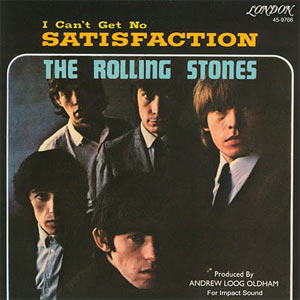
...trying to meet some girl who tells me babih [beɪbɪ] better come back
maybih [mbeɪbɪ] next week...
Grand Funk Railroad: "Some Kind of Wonderful" (1974)Here's an example from twenty years down the road, with the first British Invasion done and new artists who grew up listening to them taking to the airways. The singer of "Some Kind of Wonderful" is a white guy, but he's clearly imitating black vocal styling and AAVE. We may not notice it anymore because it's taken for granted that singers of any background may imitate black vocal stylings, but compare this to the "white" music of the 1900s and 1910s and you'll notice a startling difference.

I don't need a whole lots of money [mʌnɪ]
Well my baby [beɪbɪ], she's alright
Well my baby [beɪbɪ] is clean out of sight
As we grow further and further away from time and memories of these eras become secondhand stories, we lose the original context for this music. Like making a recording of a recording of a song, it gets harder and harder to hear until the original material is buried under noise. In the 21st century, when rock-n-roll is dead as a doornail and R&B, hip-hop, and dance music take turns dominating radio, saying “happih” instead of “happee” is so natural as to be unnoticed, even though that pronunciation has only become rarer and rarer in real life (there are other ways that black English has influenced how singers sing nowadays, but that’s unfortunately too much to include in this article). Real life may be shutting its doors on lax-happy, but it has been preserved in the amber of pop music.
MAY FEVER
Now it's time to look at the twin phenomenon that spawned "the meme of the century" (quoth Justin Timberlake), "it's gonna be may." This pronunciation is influenced not by African American Vernacular English, but by Southern American English. In particular, it's the third stage of the Southern Vowel Shift. In this stage, the sound 'ee' /i/ is turned into the diphthong 'ey' [ɪi]. We may not expect this to affect 'happy' in Southern accents because we established earlier that Southern English is resistant to tense-happy, but 'resistant' does not mean immune. Tense-happy did spread through Southern English, meaning that 'happy' now had 'ee' [i] in its final vowel, which made it eligible for the Southern Vowel Shift (although it's a less common pronunciation). 'Me' was also affected, sounding more like 'may'. This is in juxtaposition with lax-happy, where 'me' is normally not affected unless it's in an unstressed position. We'll refer to this new pronunciation as 'break-happy,' because a single vowel is 'broken' into a diphthong.THE VOCAL DIMENSION
Singing ‘may’ instead of ‘me’ actually gives you a sort of advantage when singing, as was discussed in the Atlas Obscura article. When you’re trying to hit higher notes, it’s easier to hit them if you’re singing an ‘open’ sound, like ‘may’, instead of a ‘closed’ sound, like ‘me.’ This is easy to observe in the wild. Taylor Swift will demonstrate for us with a belting portion on "I Don't Wanna Live Forever" and “Out of the Woods.” Contrast this with “You Belong With Me,” where her singing is comparably more subdued (and therefore uses the 'ee' for 'me').Taylor Swift: "I Don't Wanna Live Forever" (2017) / "Out of the woods" (2014) / "You Belong With Me" (2009)Taylor Swift’s “nemesis,” Katy Perry, also does the same thing. She sings “except for may” when belting a long note, but “this is the part of me” when singing a shorter note. Funnily enough, she sings ‘may’ in a low-intensity situation during the bridge for the sake of a rhyme: she rhymes “you can keep the dog from may” with “I never liked him anyway.”

...What is happening to may? [mɪi]
...You were looking at may [mɪi]
you were looking at may [mɪi]
you were looking at may [mɪi]...
...you belong with me [mi]
You belong with me [mi]
Katy Perry: "Part of Me (Demo)" (2010)Also notice that every instance of ‘may’ has been stressed. That is to say, the note has stress both in the musical sense (it falls on a stressed beat) and the linguistic sense (it receives more emphasis). Stress has a funny way of altering vowels; in fact, this sound change of 'me' to 'may' is more likely to occur on a stressed vowel in regular speech, as well. The 'ee' in words like 'happy' falls on an unstressed syllable, which makes it less likely that it will be diphthongized.
You can keep the dog from may [meɪ]
I never liked him anyway
… Except for may [mɪi]
This is the part of me [mi]
The "easier to pronounce on higher notes" thing also applies to lax-happy as well. You can observe this in Stevie Wonder’s "Superstition." In the first part of the song, he sings “thirteen month old baby.” When he repeats the stanza later on with more intensity, it becomes “thirteenth month old babih.” Note that, unlike happy-breaking, this instance of lax-happy has neither musical nor linguistic stress.
Stevie Wonder: "Superstition" (1972)
Thirteen month-old baby [beɪbi]...
Thirteen month-old babih [beɪbɪ]
STYLE, OR WHATEVER YOU KIDS ARE CALLING IT THESE DAYS
Belting can’t be the only explanation, since this pronunciation also occurs in lower notes. The other part of explaining this phenomenon is a bit more subjective and relies on perception. To my ear, “me” sounds more formal and stiffer than “may,” which sounds casual and relaxed. Part of this pronunciation is appearing cool and loose as opposed to sounding stiff. It sounds younger. Makes sense, because the examples we’ve seen so far are performed by young people for young people. The change itself must be more recent since happy-tensing is a later development in SAE compared to lax-happy. The youth always seeks to differentiate itself from prior generations, and one of the ways young people do that is linguistically. Slang is the most notable ones, but there are also phonetic features like creaky voice (that raspy sound Britney makes) and uptalk (when a statement sounds like a question?).This is the earliest example I’ve been able to find of happy-breaking in song. Joan Jett’s 1982 cover of the song also has happy-breaking (the 1979 version doesn’t, for some reason). Notice how the 'may' isn't stressed or on a high or long note.
The Arrows: “I Love Rock and Roll” (1975)Skip a decade ahead and we have the Beastie Boys telling us we need to fight for our right to partay. This one isn’t even really entirely sung, so none of the above applies.
And I could tell it wouldn't be long till she was with may [mɪi], yeah may [mɪi]
And I could tell it wouldn't be long till she was with may [mɪi], yeah may [mɪi]
The Beastie Boys: “Fight for your right to party” (1986)What these songs have in common is that they both have a sort of youthful rebellious spirit (facetiously, in the case of the Beastie Boys). While rock-and-roll may have been dead in the 70s, the lifestyle associated with it – sex, drugs, and rebellion, was not. The Beastie Boys song pokes fun at the mindless party songs favored by the youth, although the song was eventually adopted unironically as a party anthem by unwitting party fiends. This pronunciation is part of it. “Yeah, I love partying and rock and roll! Your dad’s not doing any of this!” And your dad’s probably not saying “partay,” either… unless he’s from Tennessee.
You gotta fight for your right to partay [pɑɹtɪi] ...to partay [pɑɹtɪi]
THE FAD FACTOR
This leads into the may-epidemic of the 90s and early 2000s that Atlas Obscura was investigating. Note the groups that they mention: NSYNC, Britney Spears, Mandy Moore. All young acts aimed at a young – specifically teenage – audience. However, the 20th century has basically been about discovering the fact that marketing music to young people is extremely profitable (youth culture), so why did this particular pronunciation only become prominent in the 90s and not earlier? It turns out that it’s not an accident.First, let’s take a look at the song that started this whole investigation. Note that not every possible instance of word-final /i/ is diphthongized: 'Finally,' 'baby,' and 'somebody' in the chorus are pronounced with long [i]. Moreover, the second verse has a different singer say "you know it's gonna be me" with long /i/ as well.
*NSYNC: "It's Gonna Be Me" (2000)The memetic nature of it was brought up in a radio interview with Justin Timberlake. In between asking him what the month after April was and what a horse eats, Justin mentions something very interesting.
I remember you told may [meɪ]
Baby [beɪbi] when you finally̝ [faɪnəli] get to love somebody [sʌmbɑdi]
Guess what - it's gonna be may [mɪi]
not Justin: But in the end you know it's gonna be me [mi]
It's gonna be may [meɪ]
It's gonna be may [mɪi]
It's gonna be may [meɪ]
Justin: I will say in my defense Max Martin made me sing 'me' that way. [...] I just want to throw Max Martin on the chopping block for that one.If you don’t know who Max Martin is, here’s the rundown: he’s an insanely successful and influential Swedish pop producer whose career took off in the 90s. It also appears to turn out that he’s the one behind this whole ‘may’ thing, because he told Justin to say it like that! Who’s another singer who used happy-breaking and was produced by Max Martin? Britney Spears.
[...] Anchor: Did he give a reason for that?
Justin: I think he just wanted me to sound like I was from Tennessee. [...] He just kinda likes that.
Britney Spears: “Stronger” (2000)And just to blow your minds, guess what other songs were produced by Max Martin? “Out of the Woods” by Taylor Swift and “Part of Me” by Katy Perry, both of which also featured happy-breaking. It is not at all inconceivable that he’s coached other singers to pronounce it like that. The earliest hit produced by Max Martin with happy-breaking was “Quit Playing Games (With my Heart),” by the Backstreet boys, released in 1996.
There's nothing you can do or say, babay [beɪbɪi]
I'm not your property as from today, babay [beɪbɪi]
Backstreet Boys: “Quit Playing Games (With My Heart)” (1996)The question is why Max Martin, a Swede, would want a singer to use that pronunciation, one that Justin rejected as sounding “like [he] was from Tenneessee”? While the pronunciation is Southern in its origins, I can’t say that it sounds particularly Southern when used by Arrows or Joan Jett or the Beastie Boys. It’s possible Max heard it on some record, liked it, and asked other singers to reproduce it. It just so happened that “Quit Playing Games” and “It’s Gonna Be Me” became hugely popular and somehow that became the sound of the very late 1990s and early 2000s. Max Martin’s artists weren’t the only ones who caught ‘may’ fever: Mandy Moore’s “Candy,” released August 1999, uses it. It's not shown in the clip, but she rhymes 'may' with 'say', showing just how far she breaks the vowel.
Babay [beɪbɪi], babay [beɪbɪi], babay [beɪbɪi]
Mandy Moore: “Candy” (1999)This plays back into what I said about ‘may’ sounding youthful. Max Martin’s not a native speaker of English, so he may have asked for that pronunciation simply because he thought it sounded cool. But it still had the youthful association that it had in the 70s and 80s, possibly because it was not very common in real life or in music. Moreover, it was now hypertargeted: the examples from the 70s and 80s were aimed at young people, but these artists were aimed more specifically at teenagers. We went from “rare pronunciation used by singers when belting/being rebellious” to “2000s teen pop fad.”
I'm so addicted to the loving that you're feeding to may [meɪ]
This feeling's got me weak in the kn-ays [neɪz]
So baby come to may [meɪ] ... swayt [sweɪt] to may [meɪ] I'm missing you like canday [kændɪi]
Eventually it faded, as all fads do. Lax-happy, by virtue of being less specific and more general, has fared better. Break-happy survives when singers need to sing a closed front vowel on a high or long note, but it’s gone back to being rare. Now that ‘may’ has gained an association with the 90s, using it can be a purposeful invocation of that era. The best example of this is Ariana Grande’s song “Baby I,” a throwback to 2000s era RnB. She uses all three possible pronunciations of baby: the tense one in the backing vowels “(baby I)”, the lax one in the lead vocals “oh baby, my baby”, and the broken one when belting “all I’m trying to say is you’re my everything, baby.” The diphthong even becomes more exaggerated when the song goes up a semitone. This song encapsulates every pronunciation and meaning of baby into three and a half minutes.
Ariana Grande: "Baby I" (2013)
(Baby [beɪbi] I) oh baby oh baby my baby [beɪbɪ] (baby [beɪbi] I)...
All I'm trying to say is you're my everything, baby [beɪbɪi]
*modulate up half-step* All I'm trying to say is you're my everything baby [beɪbɪi]
Baby, baby, baby, baby [beɪbɪ]
CONCLUSION
First, the Atlas Obscura article was actually even more accurate than I expected! I had tweeted them that I was confused as to why they didn’t mention how “blackness” played into the pronunciation and how it was older than the 2000s… but these objections actually applied to lax-happy, not break-happy. The two sounds are similar enough that I confused one for the other. I retract my Twitter objections to them; they really did a swell job.Second, it’s incredible everything that goes into a single sound. A singer’s decision to say ‘happih’ when they may normally say ‘happy’ is the result of a century-long process of imitating and ultimately de-racializing African American English pronunciations. Depending on which point in the 20th century you choose, the choice of that pronunciation could reflect a desire to invoke old-fashioned RP, to sound like a black blues singer, or to simply sound current and “soulful”. Both pronunciations are helped along by the fact that they make it easier to reach high notes, as well as sheer historical inertia in happih’s case. All this, because someone decided to draw their tongue a little further back than normal.
PS: There is one thing that I tried to research but could not come to any reasonable conclusion about. If happy-breaking is a result of the Southern shift, then it should be prevalent in country music, which encourages both authentic and fake Southern accents. Surprisingly, I actually haven't found any examples of happy-breaking in country music, old or new! Older country uses conservative Southern happy-laxing, but newer country seems to strongly prefer happy-tensing. Breaking 'ee' /i/ into a diphthong in general seems pretty rare. It may be interesting to discuss in a future article which features of Southern American English are most and least common in country music, as well as whether those features are stigmatized.
REFERENCES
- http://www.atlasobscura.com/articles/why-justin-timberlake-sings-may-instead-of-me
- http://dialectblog.com/2012/01/10/was-there-a-veddy-british-r/
- Parrish, Tim; Walking Blues: Making Americans from Emerson to Elvis, University of Massachusetts Press (2001)
- Miller, James. Flowers in the Dustbin: The Rise of Rock and Roll, 1947–1977. Fireside; 2000. ISBN 0-684-86560-2.
- https://www.phonetik.uni-muenchen.de/~jmh/papers/harrington2006jphon.pdf
- http://www.history.com/topics/roaring-twenties
- https://www.allaboutjazz.com/a-brief-history-of-the-blues-by-ed-kopp.php
- http://www.recording-history.org/HTML/musicbiz2.php
- "Listening to Music" By Craig Wright
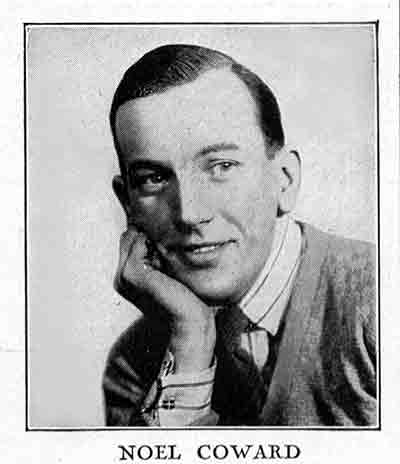

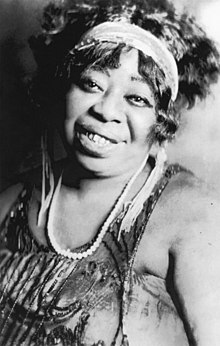
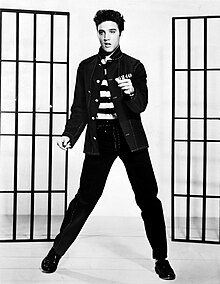
_(headshot).jpg/220px-Katy_Perry_-_Part_Of_Me_Australian_Premiere_-_June_2012_(3)_(headshot).jpg)





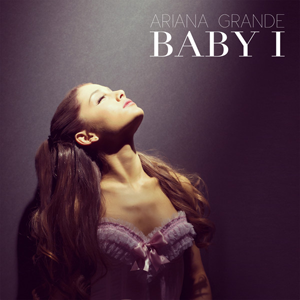
"One with good old fashioned harmony [hɑɹmonɪ]" - should this be [hɑɹmonɪi] - the "-ay" ending? That's what I hear.
ReplyDeleteOut of interest, there's a book called A Houseful of Girls by Mrs George de Horne Vaizey, written in 1902 about an upper middle class British family, in which the youngest sister is teased for affecting the -ay ending:
> "How simp-lay love-lay!" drawled Christabel, with the languid elegance of manner for which she was distinguished
If someone pronounced "lovely" as "love-lay" today, it would probably be regarded as a lower class accent (eg Estuary English).
This was a great article by the way! I loved all the musical samples.
I would like to contribute with two more songs:
ReplyDeleteMetallica - One : "Hold my breath as I wish for death, oh please god help me[meɪ]"
Gorillaz - Clint Eastwood : "I ain't happy[hæpeɪ], I'm feeling glad"
The Metallica one is actually very interesting, because it suggests that happy-breaking started in rock and metal before moving over to pop. I'm going to be doing more research on that now. Thank you for pointing it out!
DeleteThank you so much for sharing this informative and well written article! I very much enjoyed the addition of musical elements to the post.
ReplyDeleteI am left with a question though... There are occasions in the recordings which you describe as lax-happy [beɪbɪ] but sound to me like they might fit into a fourth category where the 'ih' sound is relaxed to an 'eh' sound ([beɪbɛ]?).
An example is in Grand Funk Railroad: "Some Kind of Wonderful" which sounds like [beɪbɛ] when compared to Elvis Presley: "Blue Suede Shoes" [beɪbɪ].
It would make sense to me from a vocal point of view that [beɪbɛ] is derivative of [beɪbɪ] explained by the ease of singing open vowels vs closed, but this is just my uninformed guess. I'd love to hear your opinion on this. Am I making something of nothing?
Good observation! I do think that there's a difference between [beɪbɛ] and [beɪbɪ], although they are represented the same way in the article for ease of understanding. [beɪbɛ] seems like a later development since in early recorded music, you mostly hear [beɪbɪ] and - as far as I am aware - [beɪbɛ] isn't a realization that can be found in spoken speech.
DeleteOne thing that happens in sung speech that I've noticed is that something that starts as a relatively small variation (such as the diphthongization that happens in 'indie voice') becomes more exaggerated and noticed over time. The earliest examples of indie voice diphthongization are so subtle that some people can't really tell it's there, whereas the examples from later singers like Shawn Mendes and Selena Gomez are noticeable enough that non-linguists can hear it. I'd bet a similar thing happened with [beɪbɪ] where the feature "lowered [i]" became even more exaggerated to [beɪbɛ].
Very interesting observation! I know that the traditional pronunciation of "mig" as [mi] is no longer comment in Stockholm Swedish and is now usually "mej" [mej], but I was unaware of these other changes. Considering Max Martin is one of the popularizers of this sound, this could have a role.
ReplyDeleteThe link to the audio for “Play a Simple Melody is dead.
ReplyDeleteHere’s a working link: https://m.youtube.com/watch?v=2K2K2i9VRHI
Quite a few of the other audio links are likewise dead, but I haven’t had time to track them all down tonight.
ReplyDeletehere's an example of 1920s delta blues with the word "happy" in the title
ReplyDeletehttps://www.youtube.com/watch?v=NSQK3p3XmW4&ab_channel=TheBluesfan12